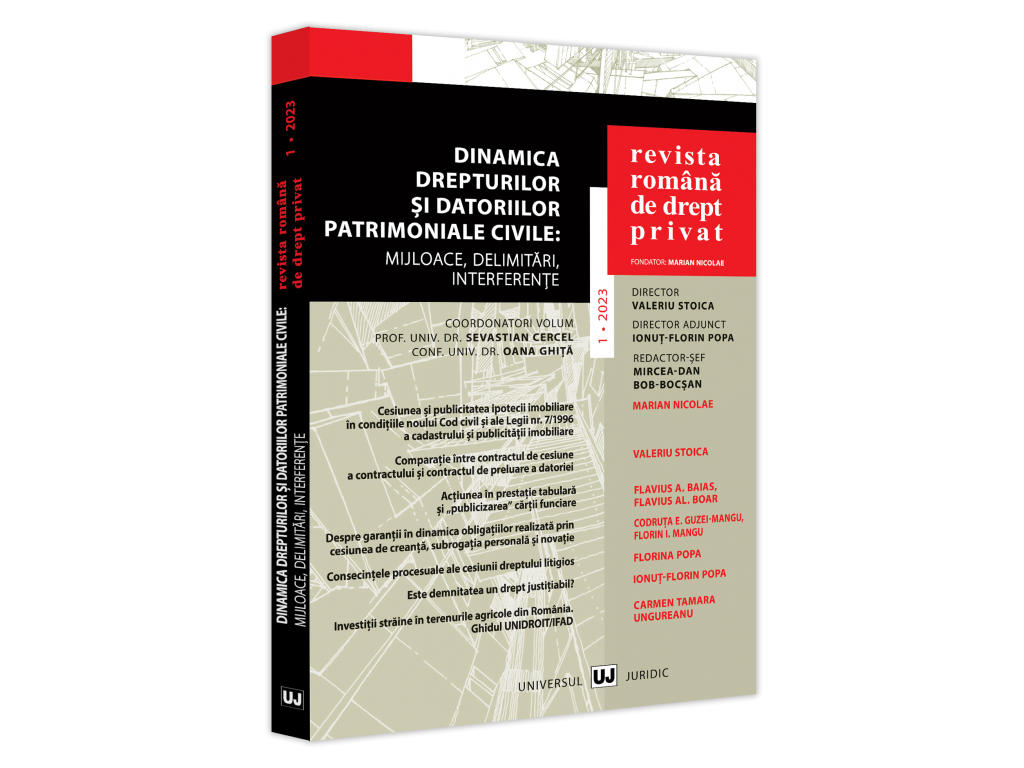Interesul în invocarea nulităţii absolute. O mutaţie de la drept subiectiv civil la excepţie procesuală
Interest in invoking absolute nullity. A mutation from civil subjective right to procedural exception
Author(s): Lucian-Dumitru Martimof, Rares PetrescuSubject(s): Law, Constitution, Jurisprudence, Civil Law
Published by: Universul Juridic
Keywords: New Civil Code; New Code of Civil Procedure; absolute nullity; relative nullity; civil sanction; general interest; private interest; interest to take legal action; Roman law; civil procedure;
Summary/Abstract: Nullity, whether absolute or relative, has given rise over time to countless theories on how it is used, on its causes or on its very existence. Although the theory of non-existence has now been definitively abandoned by Romanian legal thought, the vigilant eyes of the doctrine turn to the most energetic sanction enacted by objective law for the disregard of the rules for the valid formation of a civil legal act. Nullity (even absolute nullity) does not exist in an absolute sense. Its basis remains, in the New Civil Code, in the notion of interest, a fluid notion, undefined by objective law, the limits of which remain unknown both to doctrine and to practice. The difficulty of understanding this concept deepens when one includes in the analysis the interest of procedural civil law. We therefore feel it is our duty to focus on some aspects which we believe should lead to a clear delimitation of (substantial) interest as a condition for absolute nullity. We begin this study with an excursus into Roman legal thought, which knew, albeit implicitly, a certain distinction between absolute nullity and relative nullity, based, as we shall see, on a primordial form of interest. We then analyse the multitude of theories formulated by legal doctrine from the Middle Ages to the present day, and then go in search of definitions given to the notion of subjective (civil) right that base themselves on the notion of interest, in order to finally arrive at the possibility of giving a purely legal definition to the notion of interest itself. The second part of our analysis focuses on the definition given in the New Civil Code to absolute nullity, which is based on the interest protected by the legal norm. We try to argue that even if the sanction of absolute nullity seems to be restricted by the interest as a condition for legal action, the letter and the spirit of the New civil Code are opposed to such an arbitrary and unfounded restriction. In this sense, it is presented that most of the definitions given to absolute nullity are based on either public order, public interest or general interest, which also requires that these notions be defined and clarified. Finally, it is proposed as our central thesis that the substantive interest should override and substitute, in the matter of sanctioning a legal act with absolute nullity, the restrictions imposed by procedural legislation, which would be the real raison d'être of this thousand-year-old sanction.
Journal: Revista Română de Drept Privat
- Issue Year: 2023
- Issue No: 01
- Page Range: 251-288
- Page Count: 38
- Language: Romanian
- Content File-PDF

